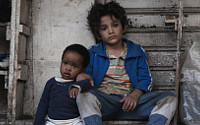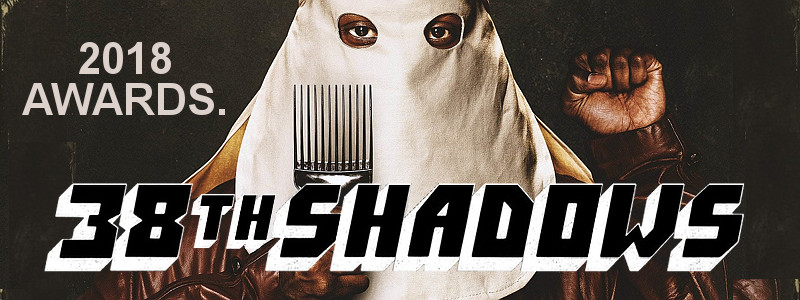| SHADOWS ON THE WALL | REVIEWS | NEWS | FESTIVAL | AWARDS | Q&A | ABOUT | TALKBACK | ||
 Shadows off the beaten path Shadows off the beaten path | ||
| Indies, foreigns, docs, revivals and shorts... | ||
|
On this page:
CAPERNAUM |
THE HARVESTERS THE MARRIAGE | MEILI < < F O R E I G N > > last update 11.Dec.18 See also: SHADOWS FILM FESTIVAL | ||
| R E V I E W B Y R I C H C L I N E | ||
Capernaum
 MUST
MUST  SEE
Capharnaüm SEE
Capharnaüm
| ||
|
dir Nadine Labaki prd Michel Merkt, Khaled Mouzanar scr Nadine Labaki, Jihad Hojeily, Michelle Keserwany with Zain Al Rafeea, Yordanos Shiferaw, Boluwatife Treasure Bankole, Kawsar Al Haddad, Fadi Kamel Yousef, Cedra Izzam, Alaa Chouchnieh, Elias Khoury, Nour El Husseini, Farah Hasno, Joseph Jimbazian, Nadine Labaki  release Leb 20.Sep.18,
release Leb 20.Sep.18, US 14.Dec.18, UK 1.Feb.18 18/Lebanon 2h01 TORONTO FILM FEST LONDON FILM FEST
|  Stunning cinematography and jarring situations make this blistering, energetic Lebanese drama both difficult and riveting, with settings so natural that it often feels like a fly-on-the-wall documentary. Filmmaker Nadine Labaki has a remarkable grip on this material, emphasising a range of big issues while keeping the focus on her remarkable cast of non-actors. The title means "chaos", but the film has raw beauty.
Stunning cinematography and jarring situations make this blistering, energetic Lebanese drama both difficult and riveting, with settings so natural that it often feels like a fly-on-the-wall documentary. Filmmaker Nadine Labaki has a remarkable grip on this material, emphasising a range of big issues while keeping the focus on her remarkable cast of non-actors. The title means "chaos", but the film has raw beauty.
Zain (Rafeea) has no birth certificate, and his parents Souad and Selim aren't sure how old he is. Officials guess he's 12, and his life is a cacophonous jumble with 11-year-old sister Sahar (Izzam) and a houseful of younger kids who all work as street vendors. In search of a responsible adult, Zain finds illegal Ethiopian migrant Rahil (Shiferaw), who works as a cleaning lady and needs Zain's help hiding her toddler son Yonas (Bankole) from her boss. Then when Rahil is arrested, Zain has to take care of Yonas on his own. The story is framed by glimpses of a trial in which Zain is suing his parents for giving him life. This may sound gimmicky, but every moment feels bracingly realistic, including clips of young children smoking, playing war games with wooden toy assault weapons or being handcuffed. Zain seems too young to be so jaded, assuming responsibilities his parents have abdicated. This includes helping Sahar hide her first period, because he's sure their parents will sell her to leery shop owner Assaad (Husseini), who lets the family squat in a tiny flat. The cast is simply astonishing. Rafeea's movie-star looks add to his appeal as a boy whose restless intelligence makes life unbearable. His connections with both Sahar and Yonas are beautifully played, packed with inventive touches that offer unexpected insight. And it's clear to see why he's drawn to Shiferaw's Rahil. She's also in an impossible situation, but is far more proactive than his deadbeat parents, who just blame their parents in turn. Labaki directs with kinetic energy, building suspense and emotional resonance at every turn. Many scenes are simply heart-stopping in their visual and emotional impact. There's a constant flow of tiny details about life on these mean streets. And the issues are full-on, with irresponsible adults, children in peril, illicit dealings everywhere and officials struggling to find justice. But Labaki never over-eggs the themes, opting instead to simply tell the story skilfully. Which makes it that much more powerful. | |
|
15 themes, language, violence 10.Dec.18
| | |
| R E V I E W B Y R I C H C L I N E | ||
The Harvesters
 Die Stropers Die Stropers
| ||
|
dir-scr Etienne Kallos prd Michael Auret, Thembisa Cochrane, Sophie Erbs, Etienne Kallos with Brent Vermeulen, Alex van Dyk, Morne Visser, Juliana Venter, Erica Wessels, Danny Keogh, Benre Labuschagne  release WP May.18 cff
release WP May.18 cff18/South Africa 1h42 
|  Evocative but elusive, this South African drama is a remarkable exploration of a subculture that is feeling threatened by societal shifts. It's also an up-close character study, looking at two strikingly different teens dealing with their identities within a tight family. Filmmaker Etienne Kallos beautifully captures the undercurrents between the people in this beautiful place, while the implied deeper thoughts and feelings remain darkly enigmatic.
Evocative but elusive, this South African drama is a remarkable exploration of a subculture that is feeling threatened by societal shifts. It's also an up-close character study, looking at two strikingly different teens dealing with their identities within a tight family. Filmmaker Etienne Kallos beautifully captures the undercurrents between the people in this beautiful place, while the implied deeper thoughts and feelings remain darkly enigmatic.
It's late-summer on the farm, and 15-year-old Janno (Vermeulen) is working alongside his father Jan (Visser) to herd cattle and prepare for the corn harvest. Then the family takes in troubled 13-year-old Pieter (van Dyk), who immediately struggles through withdrawal before adopting the family's deeply religious Afrikaans lifestyle. Janno's devout mother Marie (Venter) is praying intensely for both boys, perhaps understanding each of their struggles more than they know. Meanwhile, Pieter has noticed that Janno has secret gay longings, so offers him a glimpse of life outside this farm, which is both exciting and terrifying. There's Cain and Abel vibe here, as these two adopted orphans jostle for their place in this assembled family (their two daughters are orphaned nieces). The parents hope Janno can help make Pieter "whole" again, but actually it's Pieter who tantalises Janno with possibilities. In between frequent prayer meetings and the church rugby club, Pieter introduces Janno to local black communities, plus men who pay Pieter for sex. Janno is both horrified and intrigued by this. And his secret crush on a rugby pal adds fuels to the fire. Vermeulen and van Dyk play these roles beautifully, conveying the complicated push and pull of boys who find commonality in their outsider status and transgressive sexuality, but compete out of a sense of self-preservation. Vermeulen is superb as the good boy who longs to be bad, while van Dyk is playing a street-smart younger kid who knows that their claustrophobic religion is brainwashing the family, but after being sent to "man camp" he learns how to play the game. Janno's struggle with this clash is more nuanced. It's fascinating to watch Ventner's Marie lean toward Pieter's straightforward earthiness, while Visser's Jan is threatened by it. Kallos captures this with timeless, expansive visuals, contrasting golden farmlands with densely coloured local villages. And the askew camerawork adds to the story, such as in the film's most powerful scene, in which Vermeulen skilfully conveys Janno's most pungent emotions while filmed from behind. And with rumours of white farmers being murdered, the film quietly stirs in some present-day political texture. | |
|
15 themes, language, violence 8.Nov.18 tiff | ||
| R E V I E W B Y R I C H C L I N E | ||
The Marriage
 Martesa Martesa
| ||
|
dir Blerta Zeqiri prd Kreshnik Keka Berisha scr Blerta Zeqiri, Kreshnik Keka Berisha with Alban Ukaj, Adriana Matoshi, Genc Salihu, Vjosa Abazi, Kumrije Hoxha, Luan Kryeziu, Edon Rizvanolli, Kaona Sylejmani, Ilire Vinca, Melihate Qena, Ernest Malazogu, Aurita Agushi  release Kos 1.Feb.18, US 7.Dec.18 17/Kosovo 1h37 |
 A relaxed, enjoyably energetic drama from Kosovo, this film beautifully captures both the mood of a nation and the textures of a relationship. Set in a wintry city still recovering from a long-ago war, the story navigates an unspoken past and a culture of repression and bigotry. Director-cowriter Blerta Zegiri creates a strongly naturalistic picture of the people and the situation they're caught up in.
A relaxed, enjoyably energetic drama from Kosovo, this film beautifully captures both the mood of a nation and the textures of a relationship. Set in a wintry city still recovering from a long-ago war, the story navigates an unspoken past and a culture of repression and bigotry. Director-cowriter Blerta Zegiri creates a strongly naturalistic picture of the people and the situation they're caught up in.
With many still missing decades after the 1999 war, Bekim (Ukaj) and his fiancee Anita (Matoshi) are looking for her parents among recently recovered bodies, hoping to move forward. Then Bekim's old friend Nol (Salihu), a musician who has been living in France, walks into his bar. But there's something that Anita isn't quite getting here: the lost love Nol is pining over is not Bekim's sister Zana (Abazi), it's Bekim himself. Bekim and Anita's relationship is warm and tempestuous, but they genuinely love each other even as Bekim knows that marriage means betraying himself. Zegiri cleverly catches the sense that this upcoming wedding is an attempt to begin living again after the war put everything on hold. The characters' unanswered questions are explored through strikingly well-made flashbacks revealing the courtship through Anita's eyes as well as Bekim's earlier connection with Nol. Scenes ripple back and forth, and it's refreshing that Zegiri focusses on the warmth rather than pain. The plot puts Bekim in a tough corner, and watching this light-hearted, nice guy struggle is darkly involving. Matoshi plays Anita as feisty but almost wilfully naive, likeably hotheaded and narrow-minded. Ukaj's Bekim is more complex, engaging in nasty homophobia like everyone else, even as he can't escape his feelings for Nol. And his love for Anita is palpable as well. Meanwhile as Nol, Salihu sharply captures the mood of a man who had success in Paris but was unable to feel satisfied without Bekim. His early scenes reconnecting with Bekim are tentative, giving way to almost giddy joy when he discovers their feelings are still shared. "If the Serbs weren't killing us, our people would kill us," Nol says hauntingly, noting that the one thing everyone agrees on is the eradication of the LGBT population. And this attitude hasn't changed in the present day. The point here is that Bekim needs to deal with how he feels: he can either be a coward and pretend to be someone he's not, or he can face the truth and deal with whatever happens next. | |
|
15 themes, language, violence, sexuality 3.Dec.18
| | |
| R E V I E W B Y R I C H C L I N E | ||
Meili

| ||
|
dir Zhou Zhou prd Yu Hongbo scr Chi Yun, Zhou Zhou with Chi Yun, Zhou Meiyan, Li Xianjing, Wang Limin, Li Shuangyu, Yuan Xiaoyu  release WP Nov.18 tiff
release WP Nov.18 tiff18/Taiwan 1h28 
|  A tough journey, this Chinese drama follows a young woman who faces a series of difficult setbacks that are made worse by her decisions and reactions. It's a strikingly naturalistic film, directed with doc-like intensity by first-time filmmaker Zhou Zhou. But the abrasive nature of the title character leaves the film fascinating rather than involving. We root for Meili, but don't like her very much.
A tough journey, this Chinese drama follows a young woman who faces a series of difficult setbacks that are made worse by her decisions and reactions. It's a strikingly naturalistic film, directed with doc-like intensity by first-time filmmaker Zhou Zhou. But the abrasive nature of the title character leaves the film fascinating rather than involving. We root for Meili, but don't like her very much.
In a provincial city, the sparky 30ish Meili (Chi) rails against the incompetence all around her. This includes her girlfriend Li Wen, who drinks too much and complains she's always ill. Then just when Meili loses her job in a laundry, Li Wen decides to move to Shanghai without her. Her friends Wu Dan and Xiaoyu cheer her up, and Xiaoyu finds her a good job in his mobile phone shop. But Meili's needy sister and brutish brother-in-law are also on her back, dragging her back into a situation she desperately wants to leave behind. The story unfolds with no background, forcing the audience to work out why Meili is so angry, why she flies off the handle at seemingly minor issues and what the issue is between her and her sister. She refuses to abide by the usual social rules and makes sometimes glaringly stupid choices that the audience can clearly see are signposts of more pain to come. This storytelling style is so alienating that its impossible to feel much for anyone on-screen. It's a very well-made film, but it never grabs hold on an emotional level. That said, the performances are bracingly realistic. As Meili, Chi is sketchy and hotheaded, then we begin to understand how horribly wronged and unlucky she has been. She may be an efficient employee, but she doesn't help herself by being so ignorantly impulsive, even if everyone around her is a slacker. Each of the characters around her are just as vivid, and because they are all equally thoughtless it seems like Meili might be the only one worthy of sympathy after all. Along the way, it emerges that Meili was a surrogate mother for her sister, and now they are demanding that she support this daughter. Her girlfriend manipulates her emotionally, and her best friends hook up and move away. Thankfully, there are comical moments (including a cute karaoke sequence) and some romance as well. Add the central theme is reflected in Meili's Millennial battlecry: "Why don't you care about my suffering?" But if this is how badly she treats people who are trying to help her, what hope is there? | |
|
15 themes, language, sexuality 8.Nov.18 tiff | ||


See also: SHADOWS FILM FESTIVAL © 2018 by Rich Cline, Shadows
on the Wall
| ||
